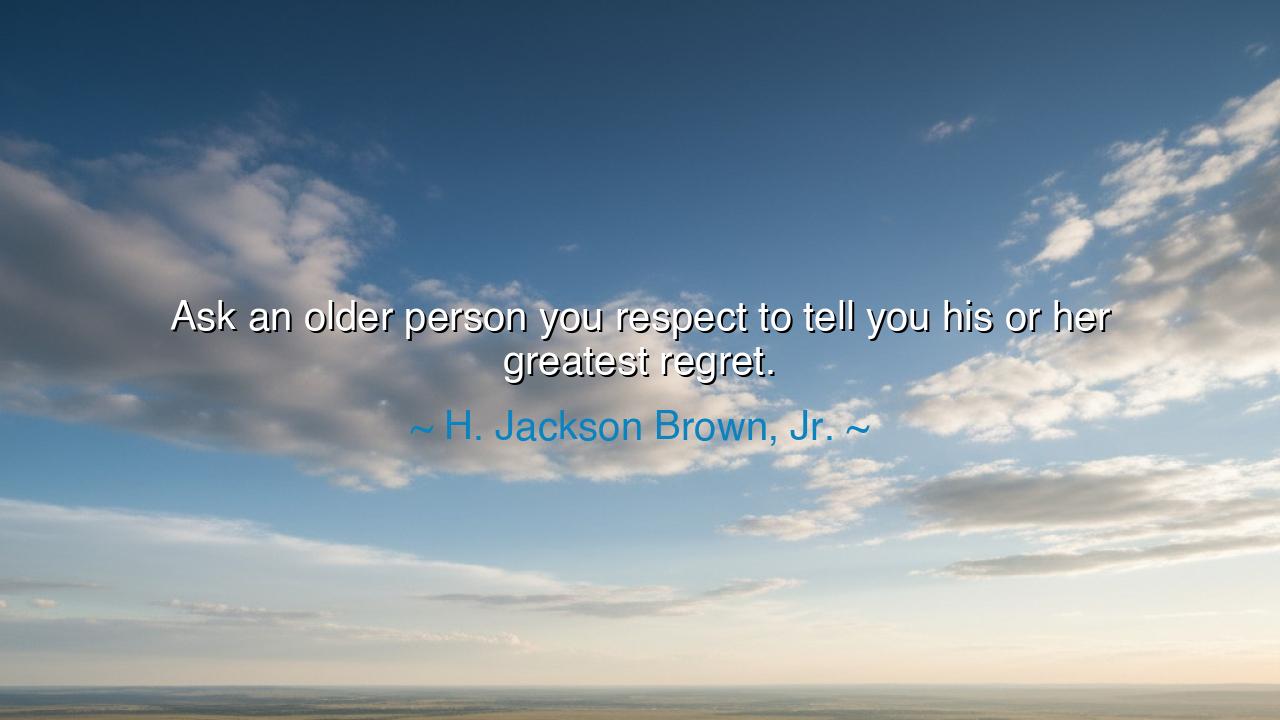
Ask an older person you respect to tell you his or her greatest






In the quiet yet profound words of H. Jackson Brown, Jr., there dwells a timeless invitation to wisdom: “Ask an older person you respect to tell you his or her greatest regret.” At first glance, this may seem a simple request — a gesture of curiosity or conversation. But beneath its simplicity lies a truth as ancient as humanity itself: that the wisdom of the old is a mirror for the young, and that the unspoken lessons of a lifetime are treasures waiting to be unearthed. Brown calls us not to idle talk, but to an act of reverence — to sit before the elders of our world and listen, truly listen, to the echoes of their journeys, their triumphs, and their sorrows. For in their regrets lies a map — one drawn in the ink of experience — that may guide us away from the same cliffs and storms.
The meaning of this quote rests upon the sacred exchange between generations. The young possess energy, ambition, and vision, but often lack perspective; the old possess perspective, yet no longer the time to act upon it. Between these two poles lies a bridge of understanding — and that bridge is story. When one asks an elder to reveal their greatest regret, it is not to stir their pain, but to honor their humanity, to recognize that every life, no matter how successful, bears moments of loss, indecision, or missed opportunity. Such confessions are not admissions of defeat but gifts of truth, offerings that teach us how to live more wisely and more courageously. For every regret, if listened to with humility, becomes a lantern lighting the road ahead.
The origin of Brown’s reflection is deeply rooted in his lifelong mission to distill life’s most enduring lessons into brief, memorable insights. Known for Life’s Little Instruction Book, he sought to capture the distilled wisdom of experience — not in grand philosophy, but in gentle reminders of what truly matters. This particular exhortation reflects his understanding that the past is not a chain, but a teacher. To ask about regret is to pierce through the illusions of youth — to realize that success, love, and happiness are not always found by force or ambition, but by reflection and awareness. The question he poses is therefore not idle curiosity; it is a moral practice, a way of cultivating empathy and foresight in the heart of the listener.
Consider, for example, the story of Leo Tolstoy, the great Russian writer who, in his later years, spoke often of his deepest regret — that he had wasted too much of his life chasing wealth, fame, and vanity before awakening to the call of spiritual and moral truth. He had written masterpieces, yet confessed that for much of his youth, he had ignored the call to compassion and simplicity. His words to the younger generations were not those of arrogance, but of repentance — urging them to live not for self, but for love and service. Such testimony, drawn from the well of regret, carries more force than a thousand lectures. It teaches us that the most valuable wisdom is born not from success, but from reflection upon failure.
Throughout history, the elders of every culture have served as the keepers of memory. The ancient Greeks revered their elders as living archives of moral insight; the Native American tribes saw the old as the storytellers who held the spirit of the people; in ancient China, Confucius taught that to honor the elderly is to honor wisdom itself. In all these traditions, the young who listened to the old did not merely inherit knowledge — they inherited perspective. And perspective is the rarest of all human gifts. It teaches that every decision casts a shadow into the future, that every missed kindness, every unspoken word of love, every compromise of integrity leaves behind the gentle ache we call regret.
There is an emotional power in Brown’s invitation that touches something universal. For when an older person speaks of their greatest regret, what they reveal is not simply an event, but a truth of the human heart — the fragility of time, the cost of fear, the fleeting nature of opportunity. Some will speak of love never pursued, others of forgiveness withheld, others still of dreams abandoned too soon. Each story becomes a warning and a blessing: to act now, to cherish more deeply, to forgive more freely, to risk more bravely. Their regrets are the unwritten commandments of life, whispered to those wise enough to listen.
The lesson here is clear and luminous: seek wisdom while there is still time. Do not wait to learn life’s truths only through your own pain when you can learn them through the reflections of others. Sit with the elders — your parents, your mentors, your teachers, your friends who have seen the turning of many seasons — and ask them, humbly, “What do you wish you had done differently?” Then listen, not with the ears alone, but with the soul. Let their words shape your path, that your own life may one day end not with regret, but with peace.
So let the teaching of H. Jackson Brown, Jr. endure as a call to all who seek understanding: the wisdom of the old is the compass of the young. Ask the question that few have the courage to ask, and you will receive the answer that many never hear. Do not turn away from the sorrow of regret — for within it lies the light of truth. Learn from those who came before you, so that when your own years ripen, your story will be one not of what might have been, but of what truly was — a life lived fully, bravely, and without fear of tomorrow.






AAdministratorAdministrator
Welcome, honored guests. Please leave a comment, we will respond soon